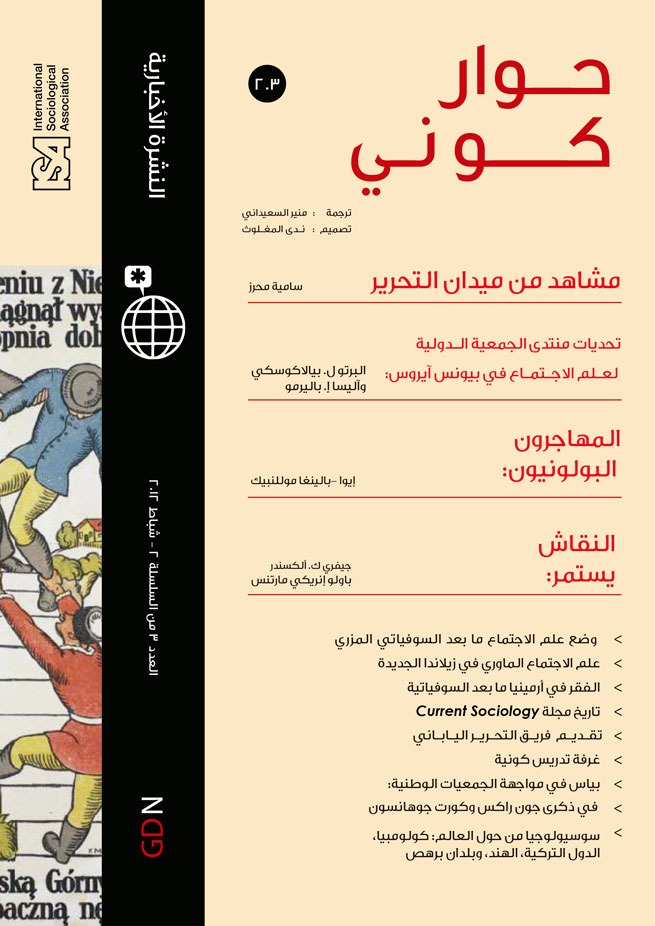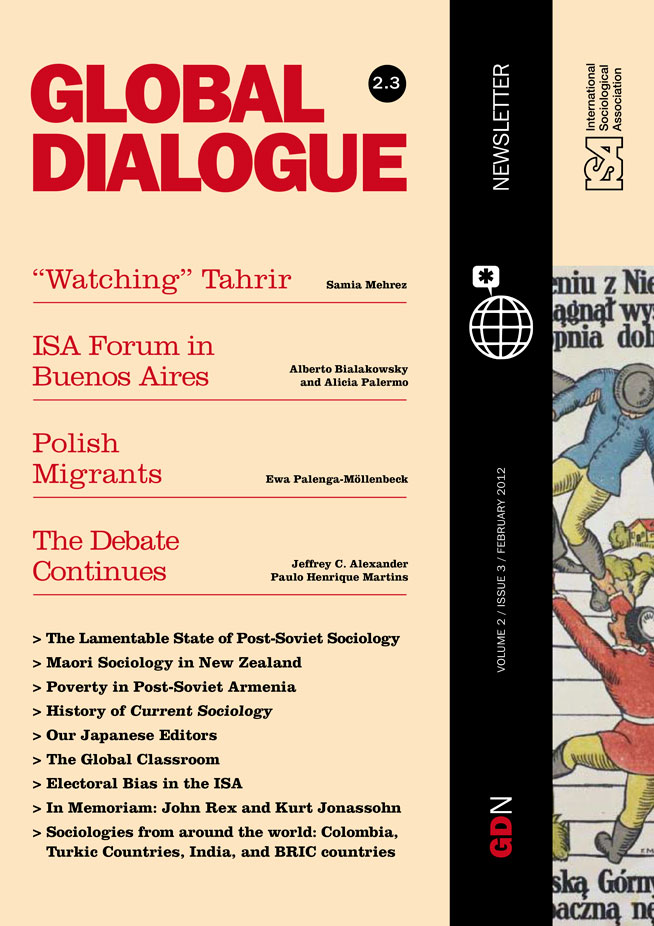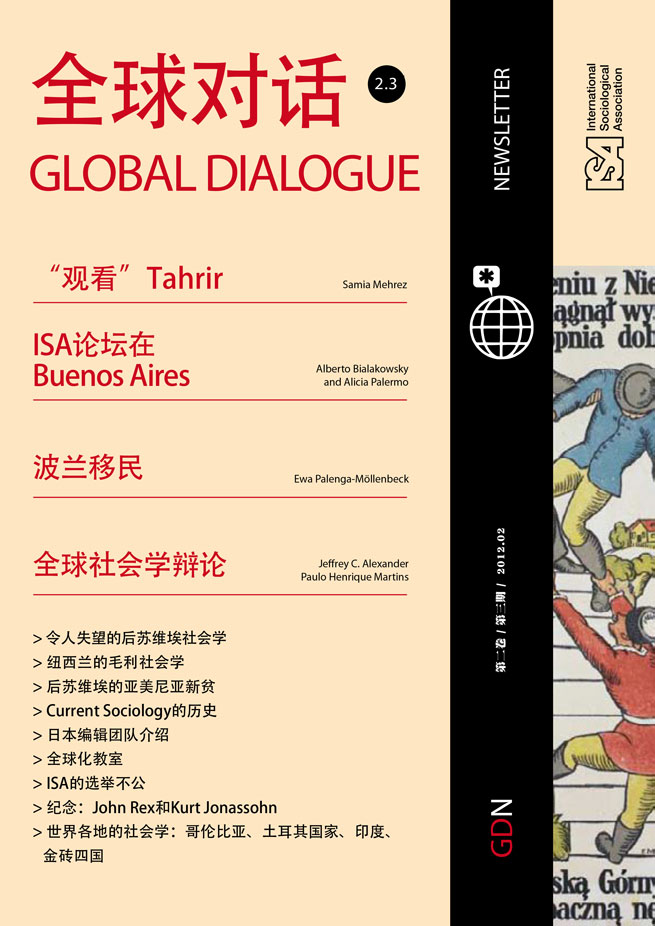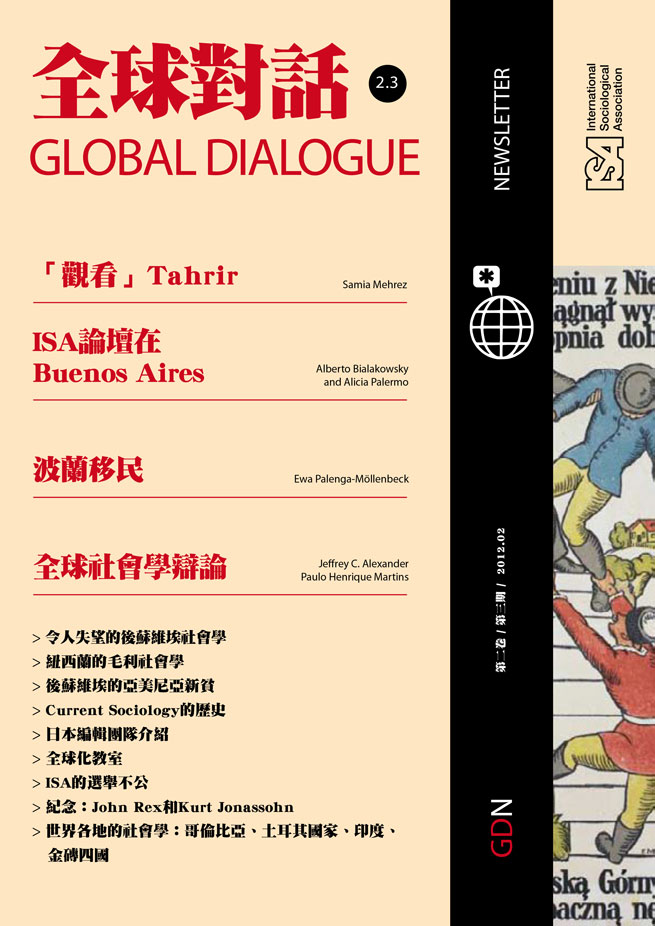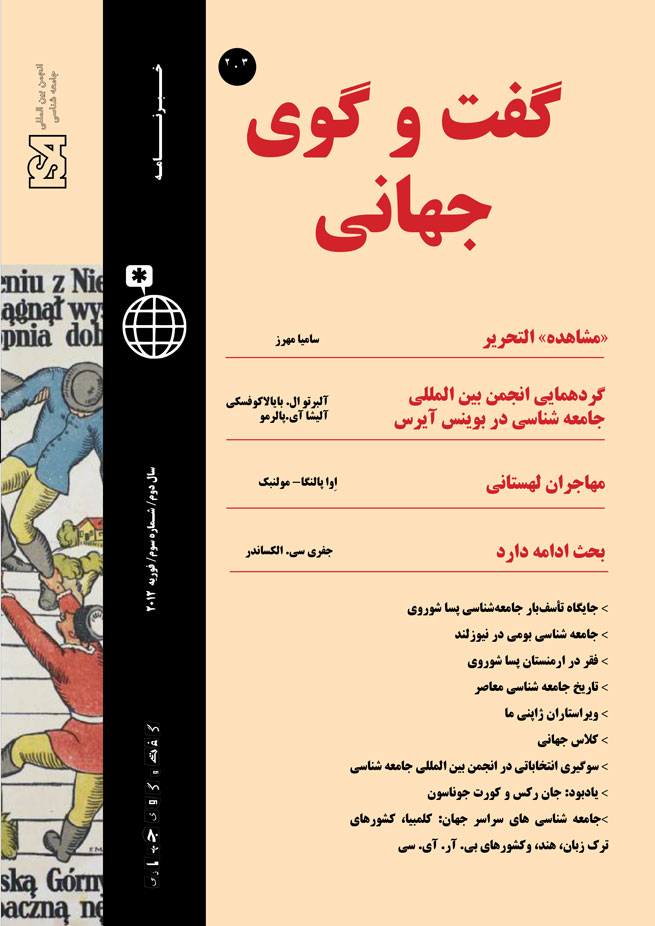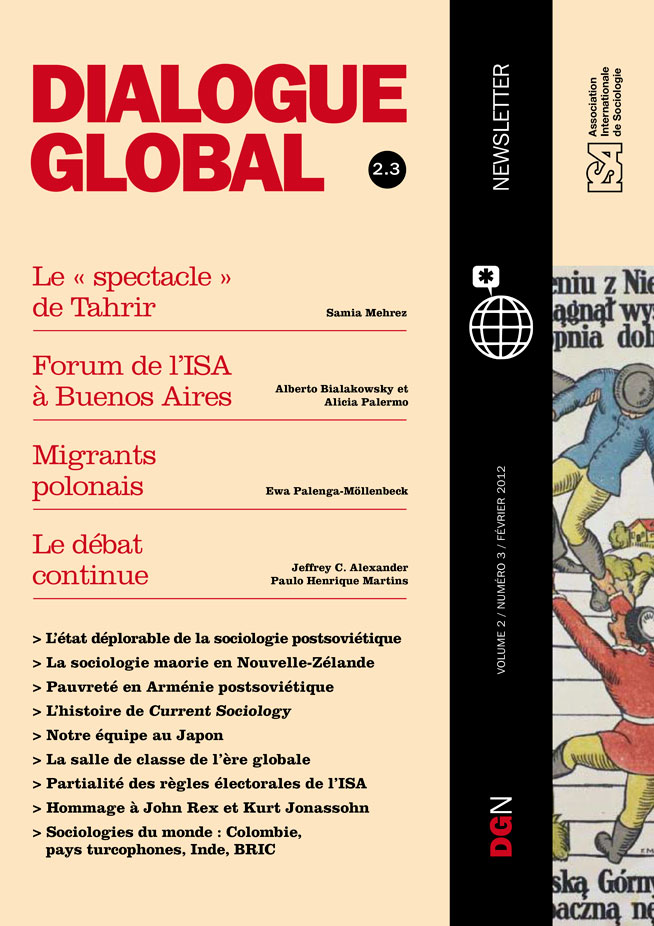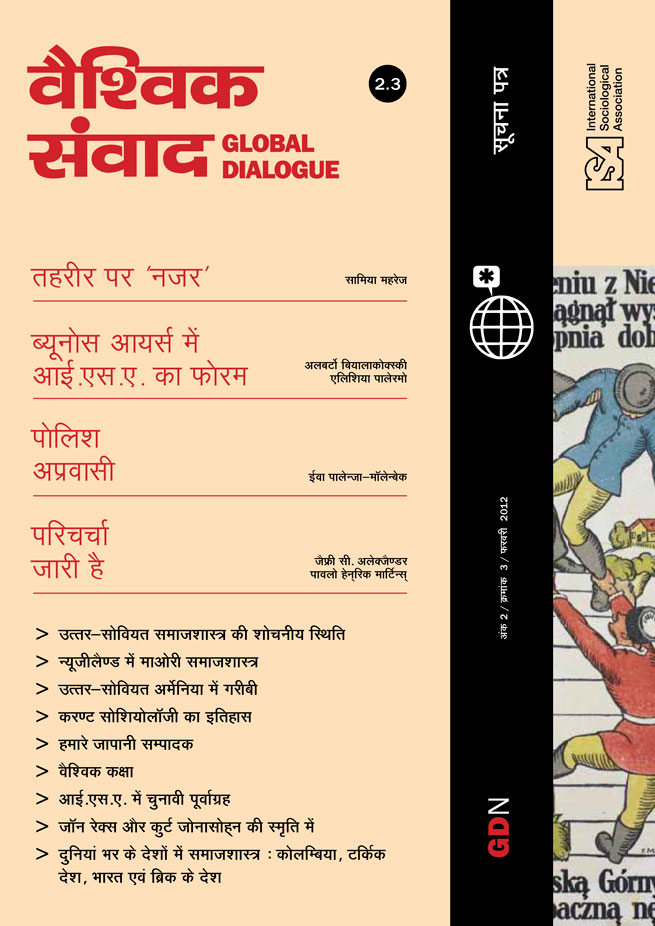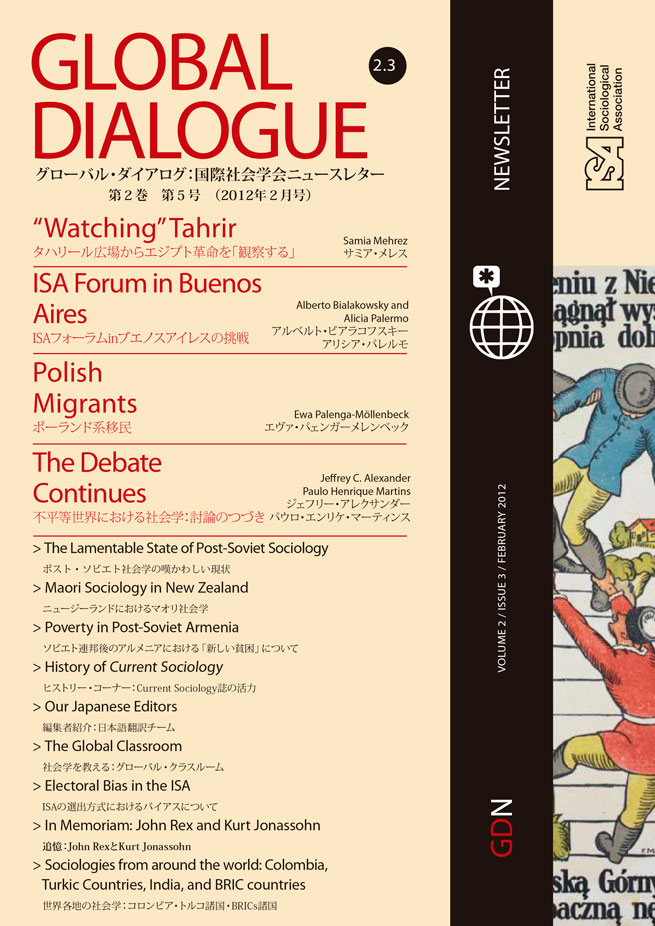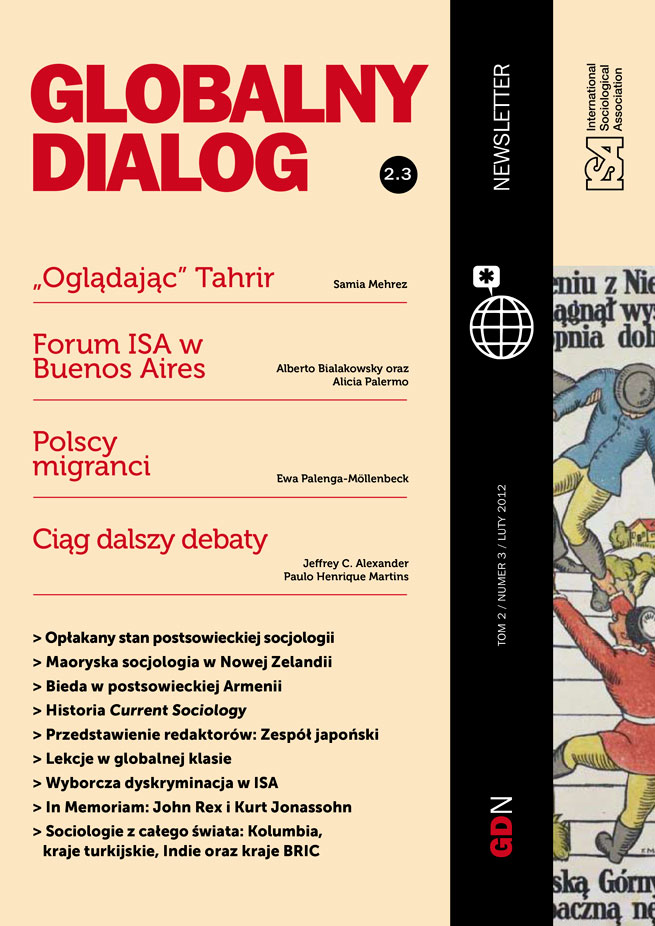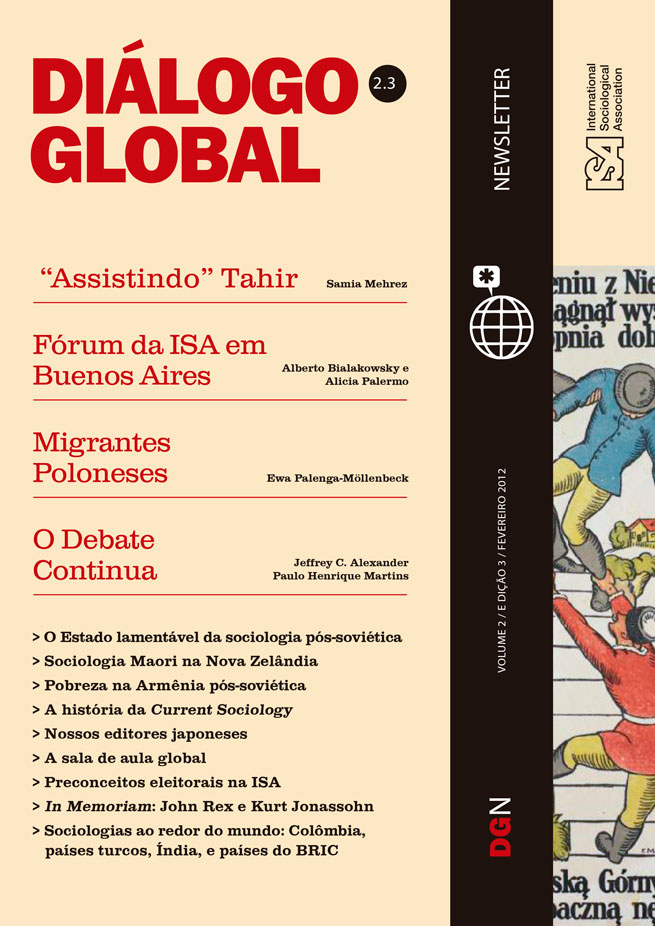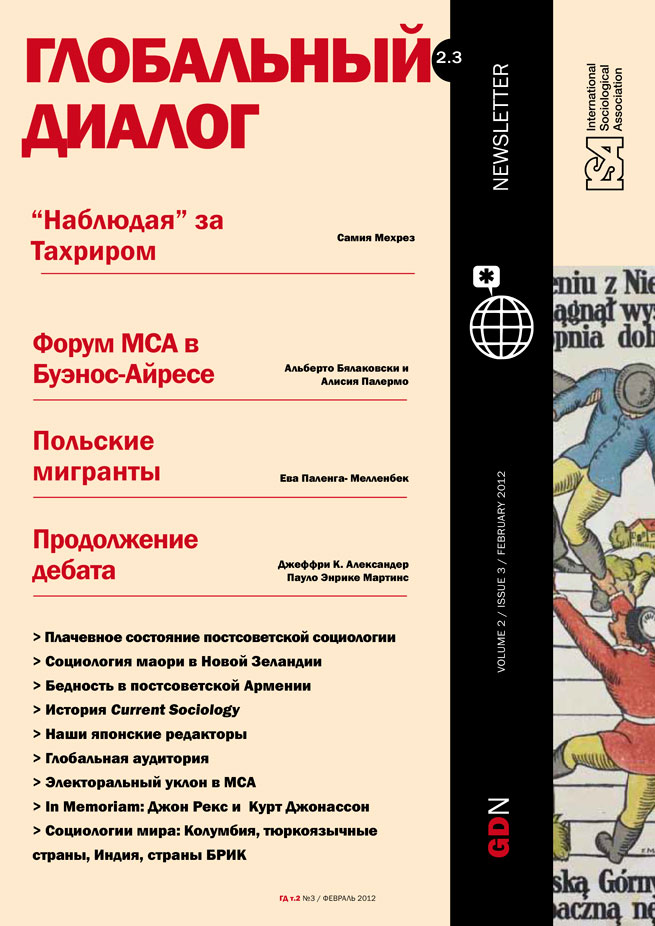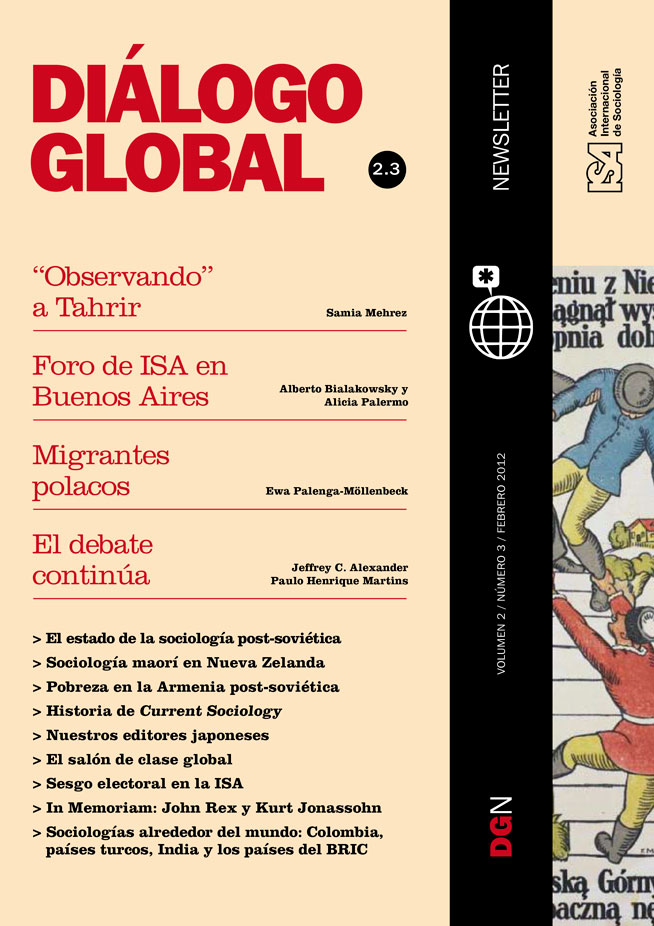Read more about Transnational Translations
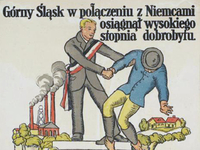
Polish Migrants: Resourceful Transnationals or Guest Workers?
by Ewa Palenga-Möllenbeck

“Watching” Tahrir
by Samia Mehrez
March 01, 2012
Preparations for the ISA Forum to be held in Buenos Aires, August 1-4 (2012) are currently underway. This process – which started with the selection of Buenos Aires as the venue – makes this Forum and this Argentinean city the site and culmination of a global, intellectual exchange in sociology and the social sciences. It is, perhaps, the most significant such meeting, having such a global scope, in Latin America in decades. Without doubt, the intellectual potential of Latin America is well known, as is its literature; nevertheless, this potential still has several steps to climb when it comes to recognizing its critical, collective, and transformative role. This Forum can already be characterized as a great opportunity for dialogue and inter-continental bridge building, and to collectively face the scientific and social challenges that inspire us, North–South and South–North alike.
We would like to underscore three important aspects of the Forum: first, the theme of the meeting, “Social Justice and Democratization”; second, the role of “subjects” in the production of scientific knowledge and social transformation; and third, the intellectual structure of the Forum itself, which may be overlooked but, in fact, gives meat to such a meeting.
Regarding the first, putting together a theme and a call for papers always entails examining specialties and subfields, but it should also involve asking questions that cross-cut them. The paradigm of complexity has facilitated an exploration of diverse points of view, and it has permitted us to overcome such dichotomies as micro and macro, disciplinary and interdisciplinary. In this way it is possible to address multiple levels and from different angles, attempting to enrich each level on its own as well as through exchanges among them. Thus “social justice and democratization” will appear in specific, concrete subfields, while also taking on multiple meanings that transcend subfields.
The history of sociology is replete with evaluations of justice and inequality. Some theoretical positions are more sympathetic to the status quo while others adopt more critical perspectives and promote social change. Placing power at the center of sociology, however, helps to reduce the distance between these oppositions. To put it differently, all sociology entails some kind of utopia and a praxis of biopolitics that motivate research and permeate – even if tacitly – theoretical foundations, applications, and analysis as well as the transfer of knowledge.
In contemporary global society, the pangs of systemic crisis demand new intellectual efforts to face social injustice, both within societies and between them. The re-emergence of the global debate on human rights brings to the fore the contradiction between significant progress in scientific and productive forces on the one side and their impact on social equity on the other, between our relationship with nature and our understanding of planetary dynamics. Efforts to control these opposing forces and assure their delicate balance produce a discourse that calls into question the superiority of the positivist, Enlightenment approach – an argument made by the Frankfurt School and, more recently, by authors in the Latin American tradition of “critical and de-colonial thinking.” Scientific progress does not guarantee social justice or full citizen participation. Metaphorically speaking, society’s tectonic plates reveal the persistence of slavery, poverty, ethnic or gender segregation, genocide, and ecological devastation.
Undoubtedly, democratization operates not just at the level of societies, but between societies, between society and nature, and even between disciplines. But ethnocentrism, anthropocentrism, and multiple hegemonies present challenges not only in conducting research on societies but also in the very interior of scientific processes of sociological understanding and discovery. Referring to “radical epistemic critique emerging from the neo-dependency school of Latin America,” Sujata Patel (2010) writes: “Theorists such as Aníbal Quijano, Enrique Dussel, and Walter Mignolo have elaborated this position, arguing that universalization inherent in sociological theory is part of the geopolitics of knowledge. The key to this process is an assessment of modernity and its relationship to social theory.”
In other words, it is not just a matter of analyzing objective questions in different research subjects, but raising the issue of epistemological asymmetries and hegemonic theorizations. The dialogic approach of the new theoretical currents denies the fixity of asymmetries rooted in paradigms of modernity, and starts out from the idea that these oppositions can be surpassed. This experience has been highlighted by African analysts. “Doing sociology in Nigeria has passed through various challenging periods. Currently, the most pressing challenge for sociologists in Nigeria, and indeed Africa, is to develop a critical capacity not only for explaining and interpreting African social reality, enhanced by endogenous models that capture the nature of the paradox and tensions in the emergent social structure, but also the character of agency thrown up by such a process. To achieve this, we need a paradigm shift” (Onyeonoru, 2010: 280).
One way or another, we believe, this form of thinking expresses the need for a new, dialogical paradigm with a corresponding scientific exchange in order to establish a new “ecology of knowledge” (De Sousa Santos, 2010). In the context of successive crises, sociologists can provide criticism and proposals for change for which intercontinental understanding is essential. This does not, however, imply dispensing with endogenous thinking, nor that we cease to aspire to debate with a planetary horizon.
Against a backdrop of social inequalities and a world in constant motion, sociologists have much to contribute, both in explaining and understanding this reality and in its transformation. The global crisis is increasingly affecting broad and diverse fractions of society in the widest variety of contexts. We can lend support to the ever more expressive demands and multiple struggles of groups affected now and in the future, as much in the Global North as in the Global South.
This leads us to ask: Can the ISA Forum 2012 meet these challenges? Without a doubt, as a unique structure, it can meet them. Indeed, the Forum aims to be an instrument of dialogue and a space for thinking together, and thereby deepening these debates. As a social and intellectual force – as a symposium and a meeting place – it has the possibility of advancing global social analysis through creative exchange. In fact, it forms a critical and reflexive community and, therefore, part of the general intellect, an intellect that is both collective and public.
We are committed to fighting for an intense and fraternal scene. We hope to stage – in a joint and shared way – a combination of debates and exchanges within and between Research Committees, Working and Thematic Groups, in the Joint Sessions as well as in the Plenaries and Public Forums.
References
De Sousa Santos, B. (2010) Para descolonizar Occidente. Más allá del pensamiento abismal. Buenos Aires: CLACSO-Prometeo-UBA.
Onyeonoru, I. P. (2010) “Challenges of Doing Sociology in a Globalizing South: Between Indigenization and Emergent Structures” Pp.268-281 in Michael Burawoy, Chang Mau-kuei, and Michelle Fei-yu Hsieh (eds.) Facing an Unequal World: Challenges for a Global Sociology (Volume I). Institute of Sociology, Academia Sinica, Taiwan, and Council of National Associations of the International Sociological Association.
Patel, S. (2010) “The Imperative and the Challenge of Diversity: Reconstructing Sociological Traditions in an Unequal World” Pp.48-60 in Michael Burawoy, Chang Mau-kuei, and Michelle Fei-yu Hsieh (eds.) Facing an Unequal World: Challenges for a Global Sociology (Volume I). Institute of Sociology, Academia Sinica, Taiwan, and Council of National Associations of the International Sociological Association.
Alberto L. Bialakowsky and Alicia I. Palermo, President and Co-President of the Local Organizing Committee, ISA Forum, Buenos Aires, Argentina, 2012
This issue is not available yet in this language.
Request to be notified when the issue is available in your language.
If you prefer, you can access previous issues available in your language:
